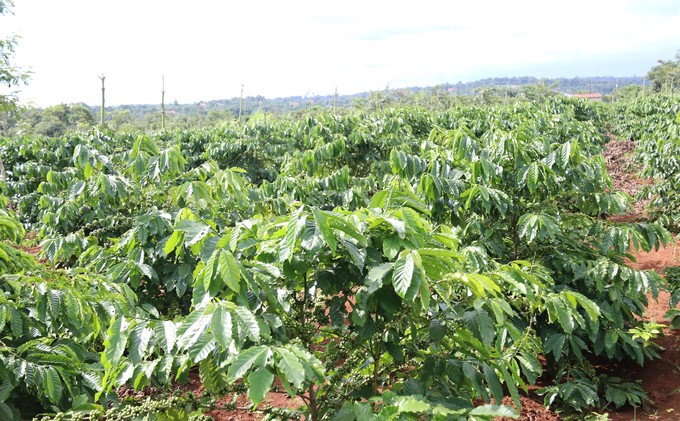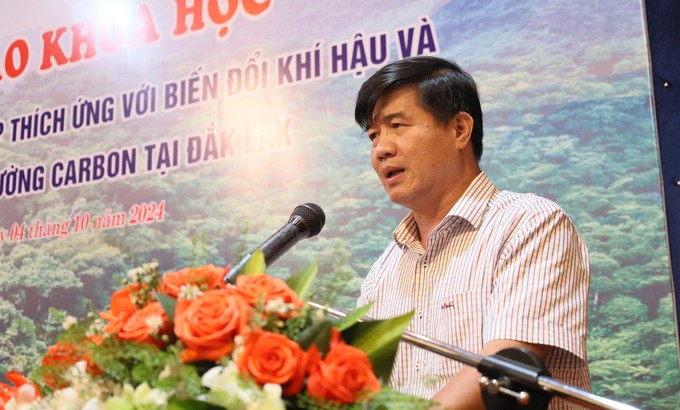May 22, 2025 | 06:16 GMT +7
May 22, 2025 | 06:16 GMT +7
Hotline: 0913.378.918
May 22, 2025 | 06:16 GMT +7
Hotline: 0913.378.918
The Union of Science and Technology Associations of Dak Lak Province has just organized a workshop on agro-forestry production adapting to climate change and developing the carbon credit market in Dak Lak.
Dak Lak currently has over 600,000 hectares of agricultural land and more than 700,000 hectares of forestry land; forest coverage reaches 38.04%. In recent years, Dak Lak's agriculture has had positive changes, including the development of commodity production with high productivity, good quality, increasing competitiveness, and sustainability associated with international economic integration.
Currently, agricultural and forestry economic models are playing a supporting role in innovating thinking and improving production levels for farmers, creating a foundation to promote sustainable agricultural, forestry, and rural development and climate change adaptation.

Dak Lak has hundreds of thousands of hectares of agricultural land to develop carbon credits. Photo: Quang Yen.
Over the past many years, Dak Lak province has applied many important solutions to proactively respond to climate change, manage resources and carbon credits, and protect the environment. However, up to now, the results are still very modest. Most agricultural and forestry production areas have not been managed according to sustainable management standards. The area calculated for carbon credits has just been implemented at the initial stage, so there are still many limitations.
At the workshop, delegates said that proactively responding to climate change, strengthening management of agriculture and forestry, and protecting the environment are issues of particular importance and large, decisive influence on the sustainable development of the country.
In addition, experts exchanged information about carbon credits, the carbon certificate market, and the current operations of the carbon credit market domestically and internationally. Developing carbon markets and mechanisms for managing, exchanging, and offsetting carbon credits is an important solution to achieve the goal of reducing greenhouse gas emissions at a reasonable cost; promoting the development and application of low-emission technology; and contributing to improving the competitiveness of businesses and the income of people participating in projects to reduce greenhouse gas emissions.
Delegates also pointed out opportunities and challenges in building and developing the carbon market in Dak Lak. Important policies related to sustainable agro-forestry development and carbon market development of the Prime Minister were also evaluated, analyzed, and provided with implementation solutions by delegates.

Mr. Nguyen Thien Van, Vice Chairman of the Dak Lak Provincial People's Committee, said that the locality has great potential for developing carbon credits from forests and agriculture. Photo: Quang Yen.
Mr. Nguyen Thien Van, Vice Chairman of Dak Lak Provincial People's Committee, said that the locality has great potential for developing carbon credits, focusing mainly on carbon credits from forests and agriculture.
According to Mr. Van, Vietnam is now in the process of establishing and organizing the pilot operation of the carbon credit trading floor from 2025 with the expectation of officially operating a carbon credit trading system in 2028. Therefore, if the carbon credit market is implemented, this will be a significant source of profit from agriculture and forestry and make a significant contribution to sustainable development, environmental protection, and combating climate change in the province.
"Through the workshop, there were recommendations and solutions for Vietnam and Dak Lak in building a legal framework, operating a carbon trading floor, and ensuring inclusiveness and fairness in the process of developing the carbon market. Delegates proposed cooperation mechanisms on carbon credits, promoting the construction of pilot projects on carbon exchange for Dak Lak province," Mr. Van said.
Translated by Thu Huyen
![Reducing emissions from rice fields: [2] Farmers’ commitment to the soil](https://t.ex-cdn.com/nongnghiepmoitruong.vn/608w/files/news/2025/05/05/dsc08881jpg-nongnghiep-140632.jpg)
(VAN) Clean rice cultivation model in Thuong Tan commune, Bac Tan Uyen district, is assisting local residents in achieving sustainable agriculture by substantially reducing costs, increasing productivity, and protecting the environment.

(VAN) At the conference to disseminate Resolution No. 68, AgriS introduced its digital agricultural ecosystem and reaffirmed its commitment to accompanying the Government in promoting private sector development and sustainable agriculture.

(VAN) 'Blue Ocean - Blue Foods' initiative is designed to restore marine ecosystems and establish sustainable livelihoods for local communities by cultivating a minimum of 1,000 hectares of cottonii seaweed in the first three years.
/2025/05/21/4642-3-112707_603.jpg)
(VAN) The V-SCOPE project has made direct contributions to three out of six pillars of the Comprehensive Strategic Partnership between Vietnam and Australia.

(VAN) Facing the threat of rabies spreading to the community, Gia Lai province urgently carries out measures to vaccinate dogs and cats on a large scale.

(VAN) Disease-free livestock farming not only protects livestock herds but also stabilizes production and livelihoods for many farmers in Tuyen Quang.

(VAN) Japan's grant aid project contributes to capacity building, promoting organic agricultural production, and fostering sustainable community development in Dong Thap province.